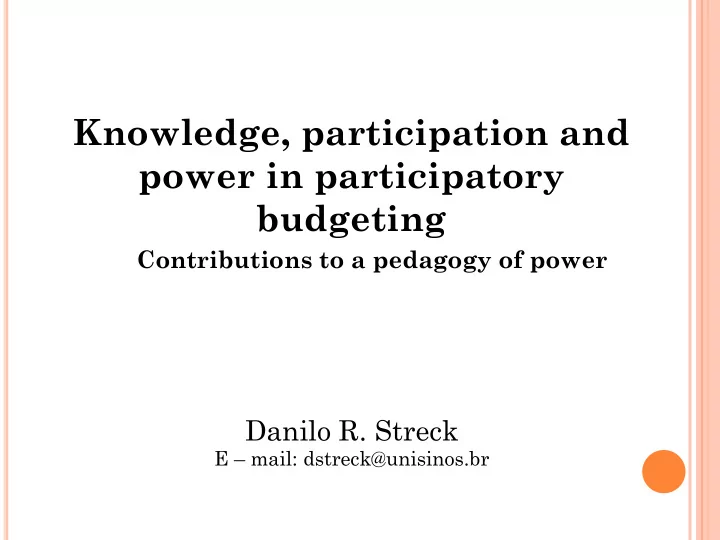

Knowledge, participation and power in participatory budgeting Contributions to a pedagogy of power Danilo R. Streck E – mail: dstreck@unisinos.br
¢ The assumption is that these three dimensions of life in society are intrinsically interlinked, with multidirectional arrows. ¢ Maybe participation will produce knowledge that is translated into another relationship with power or another way of exercising it. But it may also be that a given understanding of power creates the opportunity for participation and promotes emancipatory knowledge.
A N E XPERIMENT IN P ARTICIPATORY D EMOCRACY
R EGIONAL C OUNCILS FOR D EVELOPMENT ( C ONSELHOS R EGIONAIS DE D ESENVOLVIMENTO [COREDES])
O RGANIZATION OF THE S TATE S YSTEM OF P OPULAR AND C ITIZEN P ARTICIPATION
S TAGES OF DECISIONS OF S YSTEM OF P OPULAR AND C ITIZEN P ARTICIPATION
M ETHODOLOGICAL A PPROACH ¢ “One must detect the realities that can be potentiated, but these realities are not necessarily prescribed in a theoretical corpus; rather, they will depend on what do I want to know for, which is an axiological or ideological ‘for what’.” (Zemelman)
T HE RECONSTRUCTION OF POWER , OR : THE RECONFIGURATION OF POWER RELATIONS ¢ Power: a social relationship regulated by an unequal exchange (Santos) ¢ “Repressive” and “productive” function (Foucault) ¢ Power as a dispersed force and/or within structural spaces
S TRUCTURAL S PACES AND P OWER
¢ People (!), just to confirm what Diego said here, the reason for the distance from what happens in our town. First: it is badly disseminated, not everyone has access to the newspaper at school, at the school it has been three months since we last have seen it. Second; most of those who are here get up early, to go catch a bus to Porto Alegre, Esteio. They go to work in other places because here there are no jobs for them. So they leave the dormitory town and then they come to school, go home, lie down and sleep. (Inajara, teacher, Nova Santa Rita).
¢ And third, this is how I think: one can never disbelieve politics, one must never be ashamed of saying: I want it like this and I think in this way. The voter’s registration card is the most powerful weapon we have, regardless of a political party, of who is going to run for election or not. One must never lose motivation, one must still believe in people, because as soon as one does not believe in others, one does not even have to live, because one lives a life through dreams, goals, and one goes after them. (Inajara, teacher, Nova Santa Rita).
¢ It is not, for them [the coordinators], an easy role to play, having to explain things in all the regions. People think that things happen from one month to the next, or from one year to the next, but they have the pedagogical patience that one must have in terms of government, in terms of Regional Council for Development, in terms of the municipal administration. (Delmar Steffen, president of the Regional Council for Development of the Paranhana Valley).
¢ The system of participation itself, with a large variety of “small boxes”, makes it difficult for citizens to get in the discussions of the larger issues of society. ¢ Digital Office; ¢ Council for Economic Development; ¢ Regional Councils for Development; ¢ Municipal Councils for Economic and Social Development. ¢ Others Opacity of power relations in society
R ESEARCH , KNOWLEDGE AND POWER ¢ “Those two, the boy and the girl over there, are from Unisinos, which is doing a research work that is going to write the history of popular participation in our state, ranging from the participatory budget to the other processes. They are performing a survey, they are going to leave it here, a questionnaire for each one ... to be able to tell the story of this process which is a very rich one in our state. We are in a pioneer state, a state that has a history in the participation process ...” (Pedro Schneider, Regional Coordinator of the Sinos Valley).
Collective self-reflection (Eikeland) Theoretical Discourse X Pratical Discourse (Palshaugen)
N OTES FOR A PEDAGOGY OF POWER ¢ Student : It is time for exams and to deliver papers, and we cannot stay around here wasting time. ¢ State government representative : You are not wasting time, you are gaining time, you are gaining learning. We are discussing democracy and citizenship here, besides I think that what you are doing here is not a waste of time. I know that it is exam time, but it is a process. (Excerpts from the municipal assembly in Nova Santa Rita). ¢ Another student : Information occurs only here downtown, in neighborhoods like Sanga Funda and Berto Cirio there is no information, because sound- equipped cars... that sort of thing. I live in Sanga Funda and never heard about it, never heard, only got to know about it today through our teacher, Sandro.
S OME REQUIREMENTS OF A P EDAGOGY OF P OWER ¢ Training and equipping of citizens to read the world; ¢ Recognize in the local space a privileged place of education; ¢ Situating local topics in a global perspective; ¢ Participation in decision-making bodies and public spaces for discussion.
Recommend
More recommend